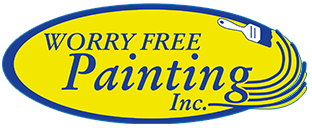- 201-666-3712
- E-mail Us
- License #13VH07929400
Interior House Painting Mistakes to Avoid

How Often Should You Repaint the Exterior of Your NJ Home?
October 9, 2024
What to Expect from Professional House Painters in Bergen County, NJ
November 13, 2024When it comes to making your home look better, only a few projects can match the impact of a fresh coat of interior paint. Whether you want to sell your home or just want to give it a fresh update, a well-executed paint job makes a huge difference. That said, interior house painting can be challenging, especially if you’re doing it yourself. This is especially true for homeowners in places like New Jersey, where local conditions like high humidity can cause additional problems. Below, we’ll talk about some common DIY or contractor mistakes that New Jersey homeowners should avoid and explain why hiring a professional can save both time and money.
Skipping Surface Preparation
Tons of homeowners skip surface preparation, but it’s incredibly important. Most people think a simple, quick, clean paint application is enough, but that’s not the case. If you want long-lasting results, you need to prepare the house properly. Surfaces need to be sanded, cleaned, and primed before any paint is applied. If they’re not, dust and grime can keep the paint from adhering properly, leading to peeling and uneven application.
NJ gets humid summers, which can complicate things further. When it’s humid, paint doesn’t stick to surfaces as well. Fortunately, professional painters in NJ have the expertise to navigate these challenges, so they’ll take steps to prep walls, whether they’re dealing with older homes with plaster walls or newer constructions that require careful drywall preparation.
Misusing Painter’s Tape
Another common DIY painting mistake is improperly using painter’s tape. It plays a big role in achieving clean, crisp lines between walls and trim, but if it’s not applied correctly, painter’s tape can make things look worse. For example, if the tape isn’t pressed down firmly enough, paint can seep underneath, ruining the finished look. Similarly, leaving the tape on for too long can make the paint peel when it’s removed.
To avoid issues like this, professionals use the best painter’s tape for interior painting meticulously. They also understand when it’s the right time to remove the tape—after the paint is dry but before it’s fully cured, so the finish doesn’t get damaged.
Overloading the Paintbrush
When it comes to paintbrush techniques, many DIY painters overload the brush. Dipping a paintbrush too deeply into the paint wastes the paint and makes drips and uneven finishes more likely. Tight areas, like trim or corners, experience this the most, since the excess paint can cause terrible looking drips.
Professional painters in NJ know just the right amount of paint to use. They carefully load the brush or roller and apply paint in smooth, even layers to keep it from dripping. Their expertise in handling different surfaces and tools keeps the final result smooth and professional.
Ignoring Primer
Many DIY painters also make the mistake of skipping the primer step. Primer acts like the foundation of the paint job and helps the paint adhere to the surface properly. If your home has older walls, past paint jobs may have left some imperfections. If you’re not using the best primer for interior walls, your new paint job might not cover existing stains, so the finish will look uneven or faded.
You want to use a moisture-resistant primer in moist places like bathrooms or kitchens to keep mold and mildew at bay. Painting professionals can determine each room’s unique needs and apply the appropriate primer.
Rushing Drying Time
Impatience is another common mistake in DIY painting. Many homeowners don’t give the paint enough time to dry between coats, which can lead to cracking, bubbling, and other issues. Each type of paint has its own drying time, and factors like humidity can significantly affect that drying time.
In New Jersey’s variable weather conditions, knowing the proper paint drying times plays a huge role in getting the smooth, durable finish you’re looking for. Professional painters will give each coat enough time to dry properly, ensuring the quality and longevity of the final result. If you rush this step, on the other hand, you might end up needing a costly touch up or even a full repaint.
Choosing the Wrong Paint
The type of paint you choose is just as important as the application process. Many homeowners pick the wrong paint for their specific job, either using exterior paint indoors or choosing the wrong finish for a particular room. This can lead to issues like cracking, chipping, or even health hazards if you use the wrong formula in poorly ventilated areas.
For example, the best paint finish for interior walls in high-traffic areas like kitchens or hallways is usually a semi-gloss or satin finish, since they’re easier to clean. On the other hand, a flat or matte finish is better suited for bedrooms or living rooms, because they don’t have to be cleaned as much. Choosing interior paint that fits the needs of each room is something a professional painter will know instinctively.
Hiring Inexperienced Contractors
While some homeowners may try to save money by hiring the cheapest contractor they can find, those contractors tend to lack experience. Painting is a skill that takes time to master, and an inexperienced painter may make mistakes that a DIYer could easily avoid. These can include overloading the brush, not using primer, or simply using low-quality materials.
When you hire the best interior house painting contractors in New Jersey, you know the job will be done right the first time. Professionals understand how to avoid painting mistakes in New Jersey homes, because they know about the state’s unique climate and construction trends.
The Benefits of Hiring a Professional
When it comes to DIY vs. professional painting services in New Jersey, there’s a clear winner for homeowners who want the best possible results. Professional interior painting in New Jersey comes with several benefits, from the high-quality materials used to the expert techniques that experienced contractors will use. Hiring professionals might seem expensive upfront, but it can save time and money by avoiding the need for costly corrections and touch-ups.


